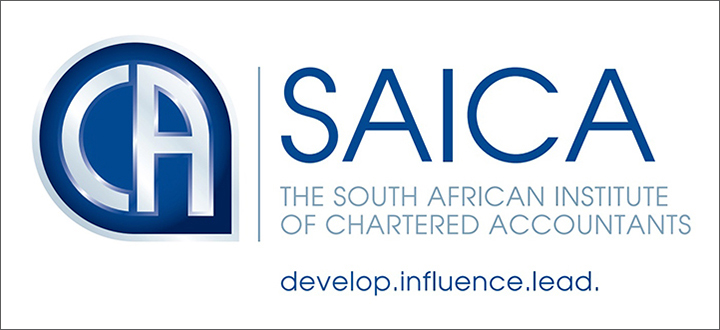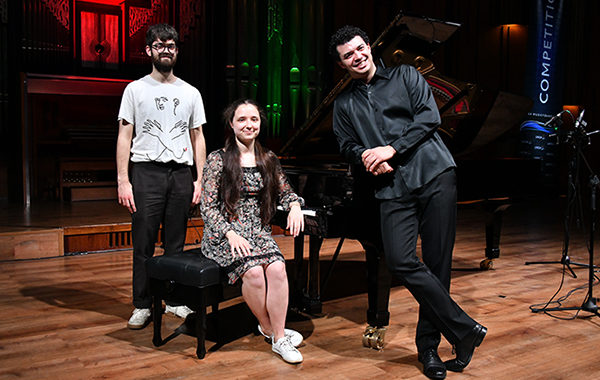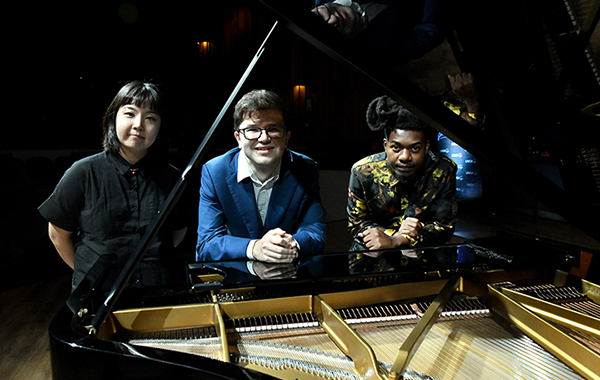Alumni
Unisa honours history makers
Unisa hosted its annual Chancellor’s Calabash Awards at the Sandton Convention Centre on 17 November 2023, to recognise the indelible strides and contributions made by the university’s alumni and remarkable individuals who shaped the country’s history in redressing the inequities of apartheid. The event was attended by various alumni, dignitaries and the Minister of International Relations and Cooperation, Dr Naledi Pandor, among other leaders of note.
Significant contributions in shaping humanity

Unisa Chancellor Dr Thabo Mbeki
In his welcome address, Unisa Chancellor, Dr Thabo Mbeki, explained the significance of the calabash, and why the university gave the awards this name. He said that different South African languages have different names for the calabash. "It is an important item, for instance," he said, "among the Xhosa people. One of its uses is to produce sour milk. In some traditions it is used for drinking water or traditional beer." In this way, suggested Mbeki, the evening’s awardees are gifted calabashes that serve humanity.
Mbeki said that part of the purpose of the ceremony is to raise funds for student bursaries and to alleviate their debts, stating that this will allow the university’s graduates to make meaningful contributions in society. He continued: "Student are an important constituency of the university, therefore the university has the obligation to produce graduates that the country needs in order to contribute meaningfully to society and create the Africa that we want."
The awards, he said, are Unisa’s way of giving recognition to extraordinary South Africans, particularly its alumni, who have made significant contributions in shaping humanity. He further explained that this event is also intended to profile the work of the university in order to inform decision makers in the public sector, business and civil society of the role and importance of the university to South Africa and the continent.
A long way to go
Quoting from a report by Harvard University and the Centre for Development and Enterprise, Dr Mbeki said that it is painful to note that South Africa is performing poorly, with exacerbated problems such as inequality and exclusion. He continued: "The economy’s ability to create jobs is slowing, worsening the unemployment levels and inequality. South Africans are deeply disappointed with social progress and dislike the direction the country is heading."
The Chancellor stated that despite the country’s enviable productive capability, the national economy is losing its international competitiveness. He said that attempts to stimulate the economy through fiscal policy and to address the exclusion through social grants, have failed to achieve their goals. He stated that the Calabash Awards recognise people who are communicating a different message to the world about South Africa through their contributions in society.
He continued: "Theirs is a message of a better future, that despite what is happening in the country, there is still capacity among our people to produce the kind of good deeds which inspire all of us." The Chancellor stated that the awardees give hope that despite these problems, South Africa can thrive. He thanked them for leading inspirational lives, which, he said, present hope to look forward to a better tomorrow.
Pivotal social engineers

Principal and Vice-Chancellor Prof Puleng LenkaBula
Unisa Principal and Vice-Chancellor (VC), Prof Puleng LenkaBula, stated that the awardees play a pivotal role in the social engineering and transformation of the continent and the global arena. She continued: "Our chancellor honours Africans who have distinguished themselves through the service they have rendered to the plight of humanity and the quest for humanising cultures, systems and civilisations in their varied iterations within the apartheid era, ushering us into the democratic dispensation which we enjoy."
The VC explained that the contributions of such people are not projected enough, and therefore, she said, "our Chancellor has required us to ensure that as we celebrate 150 years of the university’s existence, we also acknowledge, in the spirit of reclaiming Africa’s intellectual futures, those citizens and active agents in the business and political and knowledge environments, in building legal systems that are enabling the pursuit of justice in our country and the global arena."
The VC stated that Unisa is a university that allowed many leaders who were agitating for the freedom of South Africa and the continent to access higher education. She said that even in the democratic dispensation, the university is requested to ensure that it is of service to society, and it does so with dignity, commitment and openness, and ensures that it improves at all times. The VC remarked that the university caters for 37% of the PSET (Post-School Education and Training) sector in the country. This, she said, places a moral obligation on the university to ensure that it performs well.
In conclusion, the VC thanked the university’s staff members and the institution’s partners, whom, she said, have invested their tireless efforts, in ensuring that this event becomes a success.
Learning poverty
Keynote speaker, Prof Kenneth Matengu, Vice-Chancellor of the University of Namibia, speaking on Reclaiming Africa’s Intellectual Assets, stated that Africa faces learning poverty. He said that Africa’s research productivity is not as high as it could be, given its capabilities. He said one of the many reasons for this is that Africa’s access to energy is very low, despite the continent having the highest endowment of the sun and other natural resources such as water, uranium and many other things that can be converted into energy. He continued: "No country has ever industrialised without sufficient access to power."
Matengu, who holds a firm stance on alternative energy and renewable resources, stated that Africa should not be looking only at renewables. "We need to look at other forms of diversification of energy, especially from the raw material that we have, which are carbon-free." He stated that there are those who advocate for Africa not to invest in nuclear energy, because of what happened in the Fukushima nuclear disaster. "However," he explained, "Fukushima was not a man-made event; it was a natural disaster caused by an earthquake. And 75 new nuclear reactors have been built since Fukushima. So why should Africa not do it?"
Matengu stated that more efforts need to be invested in the STEM (science, technology, engineering, and mathematics) arena in order for the continent to fast-track its development.

Standing, from left: Dr Naledi Pandor, Dr Thabo Mbeki, Prof Kenneth Matengu and Prof Puleng LenkaBula
Seated, from left: Dr Dan Mosia (on behalf of Dr Sathasivian Cooper), Nandisile Thoko Mpumplwana, Advocate Ncumisa Mayosi, Nolitha Fakude and Sophia Williams de Bruyn
After the keynote address, Dr Mbeki and Prof LenkaBula presented the awardees with their certificates of recognition. The awardees are as follows:
- Outstanding Alumna Award – Nandisile Thoko Mpumlwana, anti-apartheid activist
- Outstanding Alumnus Award – Archbishop Desmond Tutu (posthumously), received by Advocate Ncumisa Mayosi, from the Archbishop Tutu Intellectual Property Trust
- Unisa Robben Island Alumnus Award – Dr Sathasivian Cooper, noted clinical psychologist
- Outstanding Public Servant Award – Nolitha Fakude, one of South Africa’s most respected and successful black businesswomen
- Outstanding Public Servant Award – Sophia Willams de Bruyn, the last living leader of the Women's March
The event was once again a highly successful celebration of outstanding South Africans, particularly its alumni, who have played a significant role in shaping society and the world through their selfless efforts in advocating for justice and inclusion.
* By Godfrey Madibane, Acting Journalist, Department of Institutional Advancement
** Photography by Shooheima Champion, Multimedia Centre
Publish date: 2023/11/21

 Unisa co-hosts G20 community outreach in the Eastern Cape
Unisa co-hosts G20 community outreach in the Eastern Cape
 Unisans gain membership of prestigious science academies
Unisans gain membership of prestigious science academies
 Advocating for disability transformation through servant leadership
Advocating for disability transformation through servant leadership
 Unisa Press continues to illuminate the publishing space
Unisa Press continues to illuminate the publishing space